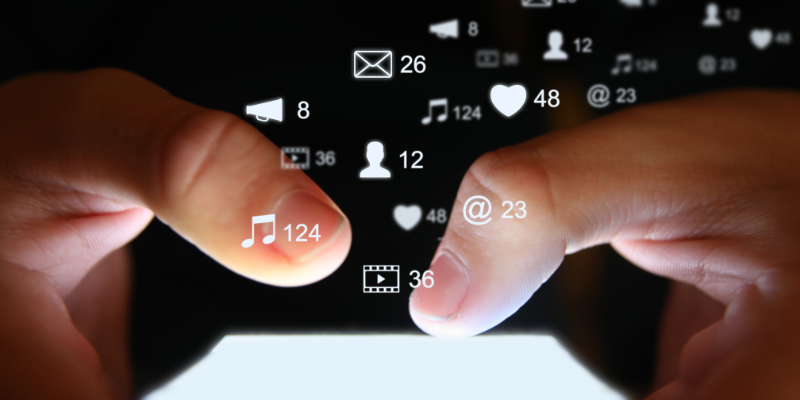
Addiction has been known to ruin lives, relationships and bank accounts. Some people assume that addiction must be tied to a substance or alcohol, but it’s actually rooted much deeper than that, straight into your brain.
In a study that involved over 1,500 professionals throughout the United States and Europe, research found that 40.2% considered Wi-Fi their first priority for luxury or necessity, followed by sex, at 36.6% and alcohol at 14.3%. At first, the study has a humorous notion to it, that technology is beginning to sink deeper into our lives. At second glance, it causes some to worry.
With increased screen time being linked to depression and anxiety, this addiction needs to be taken seriously. Most people with addiction issues have coexisting conditions, like bipolar, anxiety, depression, ADD, etc. The chances of relapsing or developing a secondary addiction are much higher with underlying brain dysfunction. Addiction is best, and most successfully treated when simultaneously treating the coexisting conditions. With more than 23 million Americans facing addiction issues, it’s more important than ever to accept that addiction is a brain disease, not a personal weakness.
Brain dysfunction is the number-one reason why people stay enthralled by the chains of addiction, and why relapse is so prominent. With six different types of addiction-prone brain patterns, it’s important to get personalized treatment. Most forms of addiction treatment are generalized, and do not address the way your brain, specifically, works. When your brain dysfunction gets addressed, you get closer to true recovery.
https://www.youtube.com/watch?v=fsk-5MFdgS8
At the Amen Clinics, we can help you and your loved ones overcome the stigma and suffering associated with ADD/ADHD, anxiety, depression, brain injury, weight loss, addictions, memory issues, brain fog, and other emotional and cognitive issues. If you are ready to regain control over your life or help a loved one do the same, give us a call at 888-288-9834 or click here to schedule a visit.





Maybe Wi-Fi technology can be addictive, but results from a survey where respondents identified Wi-Fi as being more of a priority than sex or alcohol shouldn’t be considered to be evidence to support the idea that using Wi-Fi technology is addicting. There are a lot of things that generally aren’t considered to be addictive that many would consider to be more of a priority than sex or alcohol. For instance, maybe some see things like following a healthy diet, or spending time with friends and/or family members, or following a particular set of religious beliefs to be more of a priority than sex or alcohol. Just because something might be seen to be more of a priority than sex or alcohol doesn’t necessarily mean that the thing in question is addicting. So, maybe Wi-Fi technology use can be considered to be an addiction, but I don’t see any evidence in your article to support such an argument.
Comment by tom985 — December 8, 2016 @ 7:17 PM
I totally agree with you Tom.
Comment by Eyda Cartaya — December 10, 2016 @ 6:12 AM
Maybe the discussion should be expressed as major lifestyle practices that are harmful to the body and mental clarity vs. major lifestyle practices that are not harmful, or that are even helpful. If the effects of any lifestyle practice are harmful to body or mind, then it is a bad addiction. Sugar, alcohol, exercise, sex, wi-fi, TV, sports, and yes, even excessive or obsessive religion can be harmful. But, all of the above if practiced with moderation, and with benefit to mind and body, are OK. After all, some form of relaxation and stress reduction as well as attachment to a philosophical purpose in life is healthy.
Comment by Henry — December 10, 2016 @ 9:28 AM
These are good ideas, Henry. I agree with you that probably pretty much everything that we’d normally consider to be helpful or healthy in the right amounts can become harmful when consumed excessively. So, I do see how a lot of things that we might not typically consider to be harmful and/or addictive can definitely become harmful and maybe also addictive when consumed or practiced in excess.
Having said this, I still don’t so much see how showing that people tend to prioritize the use of Wi-Fi technology over sex and alcohol amounts to evidence to support the idea that Wi-Fi technology can be addictive. Wi-Fi technology can be used for so many different things (such as work-related activities, shopping, communication, and information gathering), and it might be the case that people see the use of Wi-Fi technology as a priority because they might consider the things that they use Wi-Fi technology for to be a priority over sex and especially alcohol. This might in some ways be both bad and good, and it does make sense that if the use of Wi-Fi technology becomes too much of a priority, then that could be harmful, or possibly even addictive. The author of the Amen Clinics article is probably right that the use of Wi-Fi technology can become addictive and probably sometimes does, but I guess that I basically wanted to see better evidence than what was presented in the article.
Comment by tom985 — December 10, 2016 @ 11:42 AM
Hey Tom, Thanks for your comments. Just an additional comment here. Though Amen is doing good work in helping people who have addictions and brain traumas of all sorts, there is much work being done by others regarding how our conscious and subconscious brains interact and impact the behavior of what is generally considered normal people. An enlightening book is called The Honeymoon Effect by Bruce Lipton who is a leading cellular biologist. I highly recommend it as a worthwhile read from which one will understand how their own brains function and what they can do about it. Best wishes.
Comment by Henry — December 16, 2016 @ 6:02 AM
Thank you, Henry. The book that you mentioned sounds interesting, and I plan on taking a look at it.
Comment by tom985 — December 16, 2016 @ 9:01 AM
me too
Comment by suemenow — May 30, 2017 @ 12:11 PM
I have a friend that doesn’t know or is in denial about her addictive habits of eating, taking recreational drugs, spending hours on the web or TV and using prescriptions as crutches. I have been very concerned for her as she ages and is feeling mentally, emotionally and physically more challenged and complains about it all frequently. I have been trying to figure out how approach the subject with her. I have to be very tender when I do. I’m not sure how much energy I should put toward it though. I know people have to want to change before any change can happen. I think she might have Asperger’s and doesn’t seem to understand that many of her problems are actually coming from her own poor habbits and are not just bad luck. Suggestions?
Comment by suemenow — May 30, 2017 @ 12:21 PM
There are any number of opinions about this and I suggest you educate yourself- knowing your friend, and yourself will guide you. You have to avoid becoming the codependent one that is supporting the continued behavior to meet your own needs. If this is still a problem, start by making suggestions about activities you can do together that are shown to improve depression like physical activity, change of scenery or engaging in volunteering on a regular basis.
Comment by terre tulsiak — November 23, 2018 @ 11:15 AM
I concur with Tom.
Comment by Dr. Michael Leiker — January 18, 2019 @ 10:31 AM